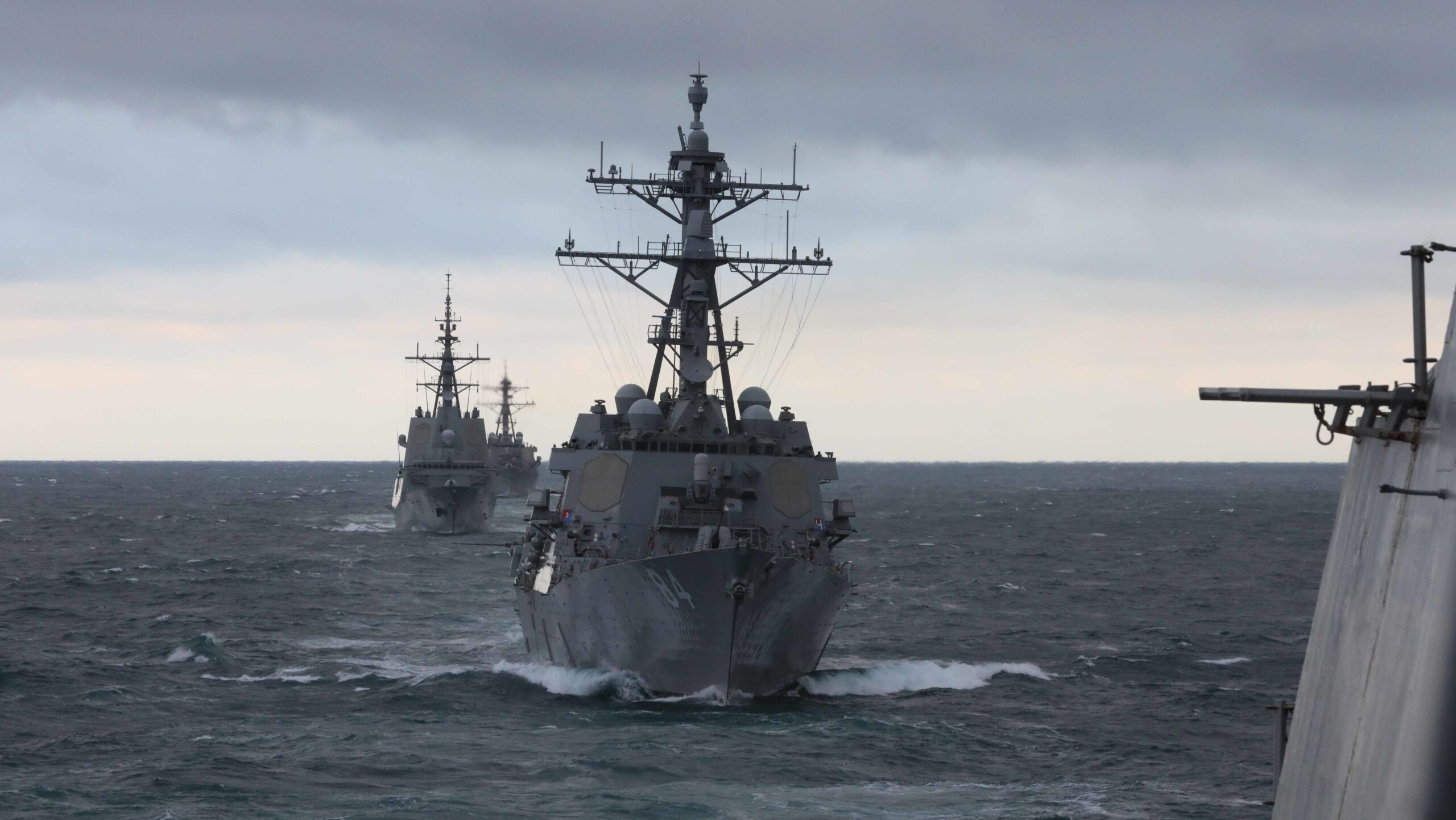Senior GOP senator accuses White House of trying to ‘game the budget’ in shipbuilding funding
Sen. Roger Wicker, R-Miss., criticized a dip of billions in the base budget, saying the administration was counting on reconciliation funds, ignoring “congressional intent.”


The Arleigh Burke-class guided-missile destroyer USS McFaul (DDG 74) participates in a multinational military exercise with NATO allies as part of the Gerald R. Ford Carrier Strike Group. (U.S. Navy photo by Mass Communication Specialist 3rd Class Kerri Kline)
WASHINGTON — A top Republican senator today called the White House’s fiscal year 2026 Navy shipbuilding budget “deeply” disappointing, revealing this year’s request “plummeted” to $20.8 billion compared to the Biden administration’s FY25 request of $37 billion.
“This shortfall reflects efforts to game the budget in anticipation of Congressional reconciliation funds, which were intended as supplemental, not a substitute,” Sen. Roger Wicker, R-Miss., said at the top of a hearing today about the Navy and Marine Corps’ budget request.
The White House has not yet published its presidential budget request in full, but Wicker, and other officials on Capitol Hill today, revealed scattered details based on what budget documents have been transmitted to lawmakers to date.
RELATED: EXCLUSIVE: Pentagon’s RDT&E Budget Revealed – Which Next-Gen Systems Get A Cash Influx in FY26?
Wicker said the new budget underfunds the Columbia-class program by approximately $4 billion and does not request any Virginia-class submarines. Both the House and Senate’s reconciliation bills include $4.6 billion for a Virginia-class submarine but noted that funding should be used for a “second” boat — suggesting they expected one to already have been funded in the baseline budget.
When asked about the cut in the shipbuilding account, Navy Secretary John Phelan did not specifically address the decline in funding, but rather just said the administration is “committed to a strong national defense and shipbuilding.”
Wicker also said the request does not include an Arleigh Burke-class destroyer, again relying on funding for destroyers proposed in reconciliation that were intended to follow Congress’ pattern of adding a third destroyer every other year.
“This budget ignores this congressional intent. Failing to include two destroyers in this year’s budget request destabilizes industry, shows bad faith and slows our shipbuilding efforts,” he said.
Elsewhere on Capitol Hill, testimony from Defense Secretary Pete Hegseth indicated this year’s budget request would include $5.9 billion for “revitalizing our shipbuilding industry,” ostensibly referring to the cash infusions Congress and the Pentagon have been making in recent years to help prop up the industrial base.
During a House hearing Hegseth claimed the budget request reflected a 14 percent increase in FY26 for the Columbia class and Virginia-class programs. (It was not immediately clear whether Hegseth was referencing numbers from the base budget or funding expected to be added in through reconciliation.)
Rep. Rosa DeLauro, D-Conn., repeatedly pressed Hegseth to elaborate on the Pentagon’s plan to improve submarine production cadence and became irate with the secretary’s claims, which she said were inaccurate, about what investments had been made under the prior administration.
“I want your plan. I’ve had difficulty with the prior administration, and I don’t mind calling them out. What is your plan for the future?” she said, raising her voice. “You could talk percentages, you could talk about whatever you want, but unless this committee sees dollars and cents and where you’re going and what your plan is, then we may reconsider what you need to do to go forward.”
Hegseth agreed to provide that information to lawmakers following the hearing.
During the Senate hearing, Sen. Dan Sullivan, R-Alaska, and Phelan also had a particularly contentious exchange during which the senator asked the secretary several questions about the Navy’s history and its obligations to meet laws passed by Congress. Phelan said he did not know the answers to the senator’s questions, but invited Sullivan to “give me the history lesson you want to do today.”
“Why don’t you answer my question? Mr. Secretary, do you want to answer the question?” Sullivan snapped back.
“I don’t,” Phelan said flatly.
Sullivan went on to ask about the amphibious ship fleet’s readiness, which both Chief of Naval Operations Adm. Jim Kilby and Marine Corps Commandant Gen. Eric Smith conceded remained less than satisfactory.
Sullivan had an exceedingly contentious relationship with former Navy Secretary Carlos Del Toro, whom he accused numerous times of not following the law, but the heated exchange with Phelan is surprising given the broad support for the Navy secretary from GOP lawmakers during his confirmation process.
Separate from the Navy’s budget request, senators throughout the hearing intermittently brought up the deployment of the California National Guard and a Marine battalion to Los Angeles to respond to protests.
Several senators questioned Smith about how Marine Corps training corresponds to tasks Marines may be given in Los Angeles.
The commandant sought to reassure lawmakers that Marines are trained in crowd control and tasked with defending federal personnel and property, similarly to how Marines abroad defend American embassies. He also said they did not have the law enforcement powers to arrest anyone.
Ashley Roque contributed reporting to this story.


















































































































































